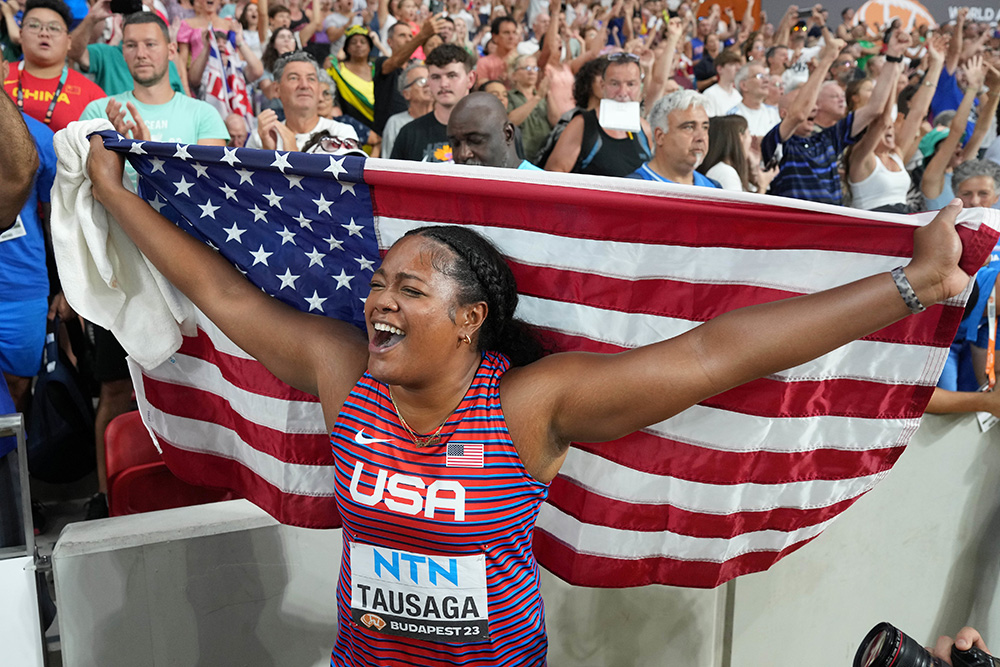
THERE WERE MOMENTS she wondered if she should be doing this at all. This, being to throw the discus.
Laulauga Tausaga-Collins never intended to be here. Here, being at the top of a podium in Budapest, becoming the United States’ first world champion in the event.
“To put my autograph in history has been unbelievable,” she said. “And nobody can take that away from me.”
Her family, coaches and colleagues long believed in her, perhaps more than she believed in herself. She celebrated the gold medal by hugging her coach, John Dagata, and staying up until 3 a.m. in Budapest FaceTiming family.
Dagata, who coaches the 25-year-old Tausaga at the training center in her native San Diego area, collaborated with previous coaches because they all recognized considerable potential.
“Laulauga is a performer. Make no mistake,” Dagata said. “She’s like a boulder. If it’s in the right line and it’s going downhill, you’re going to get out of the way. She’s going to roll right through you.”
As a child raised in Hawai‘i and California, it would have been inconceivable that track & field, or any sport, would be so meaningful to little Lagi (as she is known to friends and family). She called herself a homebody and a bookworm.
Her mother, Aveaomalo, thought otherwise. Her daughter was “growing into a big girl,” Tausaga-Collins said, and should nurture such a gift.
Mother and daughter are so close, they are like best friends. “When I see them together, they are buddies,” Dagata said.
So the daughter agreed to try volleyball and basketball. A coach wanted her to run faster… except that meant running. She thought, “I would die if I do track.”
Throwing a steel ball, that was tolerable. She went from shot putter to discus thrower to, well, gold medalist. It was an uneven trajectory.
At San Miguel High School in Spring Valley, California, she was a 47-foot putter and finished 3rd at State as a junior, 2nd as a senior. She did not throw the discus seriously until she was a senior, reached 167-3 (50.70), got to State — and fouled all her attempts.
It was a beginning, and the beginning of a sequence of setbacks. Tausaga-Collins chose Iowa for college because she wanted to live through changes of seasons. She was attracted by “Midwest niceness,” she said. She threw shot, discus, hammer and weight, winning 6 Big 10 titles.
“I’m so glad I picked that school because I got to experience so many things,” she said. “Slipping on ice. Sometimes you have to almost die to know you’re alive.”
Or to experience the valleys to appreciate the peaks. For instance, in ’19, after winning an NCAA title, she qualified for the World Championships in Doha. She fouled three times in the final and finished last.
Heading into the ’21 Olympic Trials, delayed by the pandemic, she came in at No. 3 on the U.S. list (and the T&FN formchart) and seemingly on her way to Tokyo. Impaired by a back injury, during qualifying she fouled all three throws. Again.
“It crumpled me,” she said. “You kind of come into a wall with yourself. Like, ‘Why?’ You have to question who you are as an athlete.”
In ’22, she made her second Worlds team, made the final — and finished last again. In an Instagram post, she questioned whether she belonged among the elite.
Then, at Nationals this July, she threw a PR of 214-9 (65.46) in the last round to meet the WC standard. That elevated her to 10th on the yearly world list, but nothing suggested Tausaga-Collins could contend for a medal.
She was not a good bet, and she cost sportsbooks a lot of money. On Draft Kings, a $100 wager on her returned $6500. To earn $100 on Valarie Allman, you needed to wager $155.
In Budapest, Tausaga-Collins was on the brink of another deflating outcome. Needing a long third throw just to stay in it, she produced a lifetime best of 215-1 (65.56).
“I was able to get it in a high-pressure situation,” Tausaga-Collins said.
The fifth round made all the difference. Her platter soared out to 228-0 (69.49), to a roar from the stands, overtook Allman and represented an 80-foot improvement over her first college meet 6 years ago. She climbed from No. 9 to No. 2 on the all-time U.S. list.
In the last round, she reinforced her breakthrough with 224-3 (68.36).
“The 69 was unbelievable,” she said. “But the fact I got 68 after, I was like, ‘No way, you backed it up, told the world 69 wasn’t a fluke.’”
Tausaga-Collins said she is of Black and Samoan ancestry, and she has a tattoo on her leg in memory of her late grandmother and Polynesian roots.
In Budapest, the Communications graduate wrote a Disney narrative: Cinderella meets Moana meets Hercules.
“I don’t know if I have a fairy godmother or something, or my ancestors had some say in it,” she said. “But I was able to do something tonight that I didn’t think was possible yet.”
She conceded she will be a target ahead of the Paris Olympics. However, she beat Allman, the Olympic champion, and two world champions, Bin Feng of China and Sandra Perković of Croatia.
“It’s going to be hard next year,” Tausaga-Collins said, “but it’s going to be unbelievable.”
It already is.